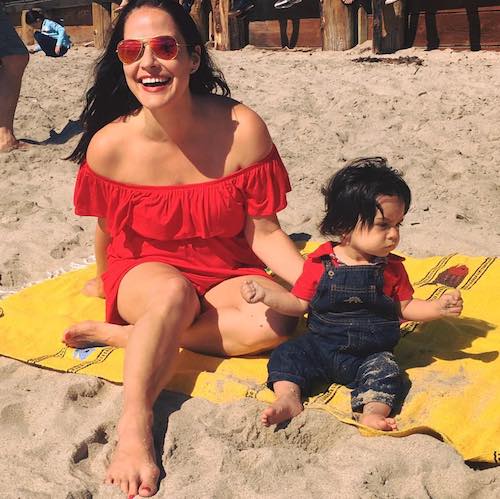
Ten months after I gave birth, I sat on my couch at 3 a.m. and realized something was very, very wrong.
My man was sleeping, my baby was sleeping, hell even the cats were sleeping. Not me. I was wide awake. For the umpteenth time. My body could not relax. My mind was racing. “This is crazy, this is crazy,” I repeated silently in my head. That’s when I realized I needed help.
When I got pregnant, I got busy—all the research, all the books, all the classes. I’m a veteran journalist, and I research everything, so I thought I was pretty knowledgeable about the good, the bad, and the ugly when it came to having a baby. Turns out, the thing I suffered from most was something that was never mentioned while pregnant, or even after I had my son. After that horrible night on the couch, I finally was diagnosed with Postpartum Anxiety.
Postpartum Anxiety was not something anyone had ever mentioned. Which was strange because every health practitioner, birth educator, and baby bootcamp instructor made sure to mention Postpartum Depression. We knew the signs, and my boyfriend especially was told to be on the lookout if I was crying all the time, angry or resentful of the baby, standoffish, or depressed. He knew to check in with me if he saw any sign of Postpartum Depression and to take action right away.
When our son was born, he had a rough time with sleeping. We tried everything, and many nights he’d start sleeping in the swing, transition to the couch with my boyfriend, then into our bed with me. He was waking every 45 minutes when his pacifier fell out of his mouth, and I was falling apart. I was a shell of my former self and convinced I had Postpartum Depression. I didn’t. I just needed to sleep.
We ended up sleep training our boy at five months old, and finally things got better. He was sleeping through the night with one wake-up. He was healthy and happy. The problem was, I wasn’t. I never got back on track. I was getting at best five hours a night, but more typically, between three and four. I dragged in the morning, unable to get up and start my day. By evening, I was exhausted. And yet, when I’d lay down at night, my mind kicked into high gear. I’d tell myself, you can do this, just push through.
Meditation. Tea. Warm milk. Melatonin. Valerian root. Books. No screens. Eye masks. Ear plugs. Ambien. You name it, I tried it.
By the time that night on the couch came around, I was done. I knew something had to change. I finally outsourced my problem on Facebook, and dozens of friends chimed in with their own stories. If I had to count, I’d guess that 30-40 moms I know were suffering from severe insomnia and sleep disorders of their own that had mostly gone untreated.
I took action. I scheduled an appointment with a doctor and a therapist. I learned that my insomnia was actually the leading symptom in Postpartum Anxiety. It was out of my control. I was plagued with “what ifs”—the kryptonite to a Type A control freak personality.
The diagnosis of Postpartum Anxiety was a relief. You mean, I wasn’t a bad mom? I wasn’t defective? It wasn’t my fault?
And yet, no one I knew had heard of this.
This is an injustice to so many mothers. That’s why I am telling my story. I want other new moms to understand that it’s not their fault. And that getting help is a sign of strength, not weakness or failure at motherhood. Please, if you’re not sleeping, if that hamster wheel goes into overdrive, talk to your doctor. If they don’t seem sympathetic, find a doctor who is.
You don’t have to suffer.
~
~
~
Author: Diana Alvear
Image: Author’s Own
Editor: Travis May






Read 0 comments and reply